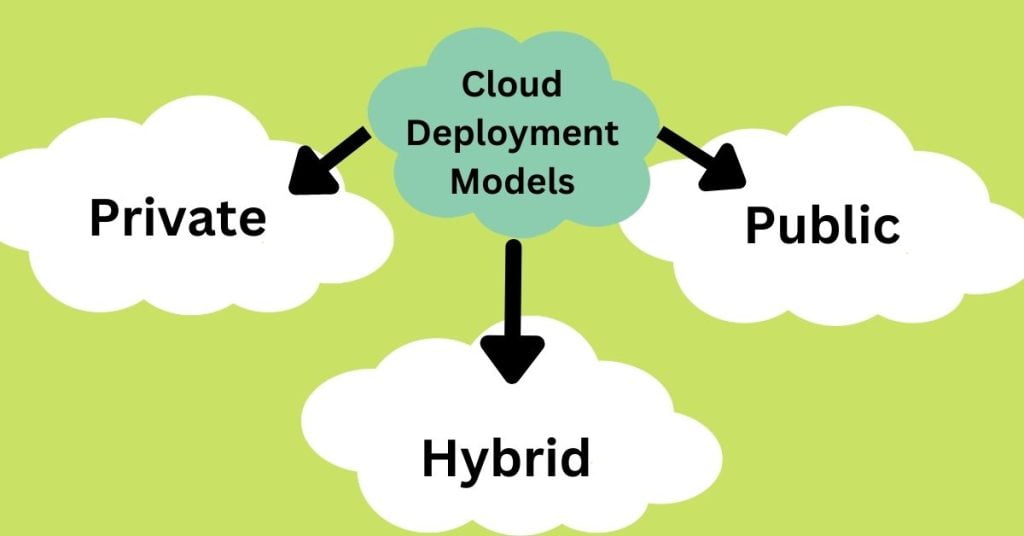Cloud deployment models refer to how cloud computing services are implemented, hosted, and accessed by users. There are other types of deployments, each with specific benefits for the user. Generally, cloud deployment models offer increased productivity in multiple ways.
There are 3 (Three)main types of cloud environments, also known as cloud deployment models. Businesses can choose to run requests on public, private, or hybrid clouds – trusting their specific requirements.
- Public Cloud Deployment Models
- Private Cloud Deployment Models
- Hybrid Cloud Deployment Models
Public Cloud Deployment Models:
A public cloud condition is owned by an outsourced cloud source and is accessible to many businesses by the Internet on a pay-per-use model. This cloud deployment model provides services and infrastructure for companies that want to save money on IT operational costs. Still, it’s the cloud provider who is responsible for the creation and maintenance of the resources.
Public clouds are Models for small and medium businesses with a tight budget requiring a quick and easy platform to deploy IT resources.
- Easy scalability
- No geographical restrictions
- Cost-effective
- Highly reliable
- Easy to manage
- Not considered the most secure option for sensitive data
Read More: Proposed Cloud Security Framework
Private Cloud Deployment Models:
A private cloud consists of computing resources required to be used exclusively by an organization or business. The cloud can be physically located in your organization’s on-site data center, or a third-party service provider can host it. The private cloud deployment model is a bespoke infrastructure owned by a single business, providing a more controlled environment where access to IT resources is more centralized within the company. This model can be hosted externally or managed internally. While private cloud hosting can be expensive, it can provide larger businesses with a higher level of security and more autonomy to customize networking, storage, and compute components to suit their IT needs.
- Improved level of security
- Greater control over the server
- Customizable
- Harder to access data from remote locations
- Requires IT expertise
Read More: Proposed Cloud Security Framework
Hybrid Cloud Deployment Models:
A hybrid cloud environment is an excellent option for businesses seeking the benefits of private and public cloud deployment models. A hybrid cloud model combines the two models and provides a more tailored IT solution that meets specific business requirements.
- Highly flexible and scalable
- Cost-effective
- Enhanced security
- Communication at the network level may be conflicted as it’s used in private and public clouds.
Read More: Proposed Cloud Security Framework
What are the Types of Cloud Computing?
Cloud computing refers to a collection of services that provide businesses with an affordable solution to enhance their IT capabilities and functionality. Companies can use cloud computing to ensure a reliable IT solution that meets their needs. The following sections detail the different types of cloud computing, including the three main deployment models and the cloud services available.
Read More: Proposed Cloud Security Framework
Cloud Service Models
There are 3 (three) main service models of cloud computing –
IaaS – Infrastructure as a Service
PaaS – Platform as a Service
SaaS – Software as a Service
There are apparent differences between the three and what they can offer a business in terms of storage and resource pooling. Still, they can also interact to form one comprehensive cloud computing model.
Read More: Proposed Cloud Security Framework
IaaS (Infrastructure as Service):
It is the most common cloud computing service model because it provides the basic infrastructure of networks, virtual servers, operating systems, and data storage drives. Allows for the flexibility, reliability, and scalability many businesses seek with the cloud and eliminates the need for in-office hardware. It is ideal for small and middling-sized companies looking for a cost-effective IT solution to support business growth. IaaS is a fully outsourced pay-for-use service as a public, private or hybrid infrastructure.
Read More: Proposed Cloud Security Framework
PaaS (Platform as a Service):
Provides a custom application framework that automatically manages operating systems, software updates, storage, and supporting infrastructure in the cloud so that companies can streamline their application development and delivery. This is where cloud computing providers site the infrastructure and software framework, but businesses can develop and run their applications. With PaaS, web applications can create quickly and easily, and the service is flexible and powerful enough to support them. PaaS solutions are scalable and model for business environments where multiple developers work on a single project. This is useful when an existing data source needs to use.
Read More: Proposed Cloud Security Framework
SaaS (Software as a Service):
Web-based software that is typically available via subscription. A third-party provider manages all technical issues, such as data, middleware, servers, and storage, reducing IT expenditures and simplifying maintenance. This cloud computing solution involves various businesses deploying software on the Internet that pays through a subscription or pay-per-use model. Uses cloud providers to manage the server, hardware, networking, virtualization, and storage needs while organizations manage specific data and applications on-premise.
Read More: Proposed Cloud Security Framework


